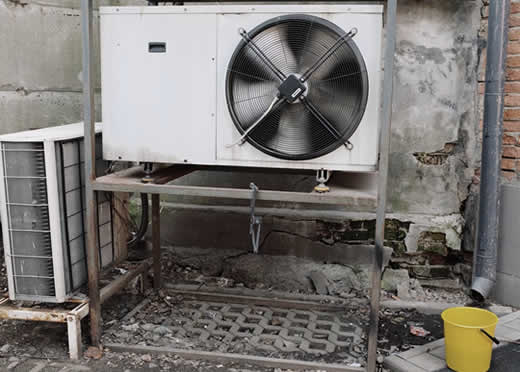Central Air Conditioner Draining Water
If you are worried that your central air conditioning is draining water in larger quantities than appears normal, you might need to do some investigations to find out why.
Let's take a look at this process and discover what can be done and how to go about it.
Where Does Water Come From in an Air Conditioner?
 The water that drains out from central air conditioning units is generally condensate that has naturally accumulated on the cooling coils inside of the unit.
The water that drains out from central air conditioning units is generally condensate that has naturally accumulated on the cooling coils inside of the unit.
Air conditioners draw humidity from the air in a room and funnel the condensed water, or condensate, into a drain. How much condensate the AC produces will vary from model to model but as a rule of thumb, it will increase as the humidity level outdoors rises.
Modern air conditioners will generally produce anything between 5 to 20 gallons of condensed water from the air each day.
Portable Air Conditioners
A note about portable AC units is worth adding here. These smaller coolers still produce condensate that fills a container inside the unit. This needs to be manually emptied periodically.
However, there are a number of air conditioning models with self evaporating technology that avoid this chore by recycling the condensate. This is to assist in the cooling process, after which the excess moisture is re-evaporated and exhausted out through the vent pipe.
This should not be confused with free standing unvented air conditioners that are really evaporative coolers (for more information, please read my article on these types of coolers).
An increase in the amount of water draining from your air conditioner is not something to be unduly worried about, unless you happen to notice a very dramatic increase (or decrease) in volume where there is no corresponding change in the humidity level.
In such a case it would be a good idea to call in an air conditioning technician to take a look.
Condensation
Condensation from moisture in the air accumulates in an air conditioner while the unit is cooling the air.
The air indoors is circulated across cooling coils that are filled with a cold refrigerant gas. The coils accumulate condensate in much the same way as you'd notice a bottle of cold water becoming damp on the outside in a warm room.
The condensed water drips down from the coils into a collection pan and then drains outside the building. This is just a natural by-product of the cooling process and again, is no cause for concern.
Humidity
Humidity is a measure of the amount of water vapor that is present in the air.
On days of high humidity, you will likely notice an increased amount of water draining from your air conditioner. This is quite normal and is in fact just the process of the air conditioning removing the excess water from the air.
An air conditioning system contains no other water that could be leaking. Thus, any water exuding from your central AC is just harmless condensate.
Overflowing Drain Pan
It is important to monitor the drain on your air conditioner to be sure that water continues to flow freely.
The drain hole in the collector pan that gathers the dripping condensate inside the unit can become blocked. This often happens when small amounts of debris or even algae growth clogs the drain.
If the drain becomes blocked, the container will fill with water and potentially leak or overflow.
In most modern AC units, a rising level of water in the tank will trip a switch that will turn off the unit and in most cases, sound an audible alarm.
It is worth it to be aware that in older AC installations, this feature may not be present.
Summing Up
It is normal for an air conditioner to produce water that drains out of the system while it is in operation. Problems generally only manifest when blockages occur, in this case in the drain hole and/or tube.
To avoid an instance of a blocked drain, it is good practice to inspect your air conditioner's drain pan and outflow tube when the cooling season begins and clear them of any debris if necessary.
Undertaking air conditioning diagnosis and maintenance is not a job for everyone, of course. If you prefer to get an expert in to do this, contact a local HVAC company and perhaps set up a regular maintenance schedule with them to avert problems down the line.
Posted: June 11, 2021
![]()

